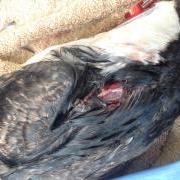Links to vets in Guernsey
Local useful links
Website donated by:

Yesterday afternoon the GSPCA were called to an injured guillemot at Petit Bot.
When GSPCA Ambulance Collection Officer Geoff George arrived he was faced with a very distressed and badly injured bird.
The guillemot had been caught with a floating fishing lure which had 3 sets of 3 hooks embedded in the back of the bird.
The lure had to be cut off and stitched which took place yesterday at Isabelle Vets.
The bird was then transported to the Shelter where he has been named Stitch and was placed in an intensive care unit over night.
Steve Byrne, GSPCA Manager said "Poor Stitch must have been in a great deal of pain and distress and if it hadn't been for the kind member of public finding this poor guillemot then he would have surely died last night."
"We see hundreds of injured seabirds at the GSPCA every year and many come in due to fishing line, netting and hooks that are discarded and the GSPCA would urge all those that do fish not to discard litter as it puts our wonderful wildlife at risk."
Geoff George Animal Collection Officer said "It is so sad when we are called out to animals and birds that are caught or injured by litter."
"From birds to hedgehogs we see so many horrendous incidents of litter injuring and even killing wildlife in Guernsey."
"The first 24 hours is always the hardest for injured wildlife and fingers crossed Stitch will pull through so he can be released back to where he belongs."
What you can do to help to help the animals of Guernsey
Protecting pets, farm animals and wildlife from harmful rubbish is straightforward – simply dispose of your waste responsibly.
Everyday objects can become hazards to animals and birds
Please help keep Guernsey tidy and our animals safe.
Have you thought of sponsoring an animal pen at the GSPCA? For more details please click here.

The Guillemot
The UK's coasts have many stretches of cliffs where seabirds breed such as the 950'000 pairs of Guillemots live and breed around the UK. They comes to land only to nest, spending the most of their life at sea, where like Dave and his friends are vulnerable to oil spills. Guillemots are dark brown and white, not as black as the similar Razorbill, it has a 'bridled' form with a white ring round the eye and stripe behind it. Their Latin name is Uria aalge and they are part of the Auks (Alcidae) family. In winter they are widespread around UK coasts but usually well offshore. However during bad weather such as gales they can be forced inland. They feed on fish and crustaceans and you are best to see them between May and July when they breed.
Here is a video of a guillemot release earlier this year.
To download a brochure all about the Animal Welfare Seafront Sunday please
Have you got a GSPCA Hoody, Polo Shirt, Sweat Shirt or T-shirt? If not get yours by clicking here.
We have lots of animals in need of homes. Could you help us advertise them? To download a the posters please click here. or to share them on social media please click here.
To find out about our Events, how to become a Member, Sponsor an Animal Pen, our Wish List, Corporate Sponsorship & Volunteering, , our New Build & Redevelopment Appeal and much more please click here.
There are many ways to support the work of the GSPCA and you can even donate online by clicking the paypal link below.

By post cheques payable to 'GSPCA' - GSPCA, Rue des Truchots, St Andrews, Guernsey, GY6 8UD
Or by phone 01481 257261.
To find out more regarding our Angel Sponsorship Scheme please click here.
Have you liked us on facebook yet or joined us on twitter?



Links to vets in Guernsey
Local useful links
Website donated by:
Post new comment